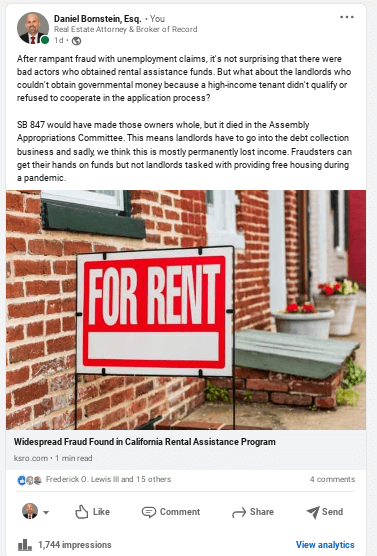Rental assistance bill stalls in the statehouse
![]()
Landlords are forced to wear many hats and for many, a debt collector is yet another one. Sadly, we think the prospect of recovering COVID-related rent debt is dismal.

As our office continued to deal with the residue of the pandemic, we were hopeful that the landlording community would be made whole with governmental funds put aside to pay for COVID-related rent debt. Regretfully, there will be many landlords left in the lurch.
If all of the boxes were checked, rental property owners could recover up to 80% of rent debt during certain periods when it accrued. Sitting on billions of dollars in federal funds, California eventually said that it would pick up the tab for all of the rent debt amassing during the pandemic if landlords and tenants qualified.
Yet there were many rental property owners that couldn't tap into the well. Either the tenant earned too much income to qualify for rental assistance or the tenant refused to participate in the application process.
We were excited, then, to learn of SB 847, a bill that would give much-needed relief to landlords who have been deprived of rental assistance dollars available through the COVID-19 emergency rental assistance program (ERAP). Under the proposal, landlords would produce evidence that they did not obtain governmental funds or that a civil money judgment was obtained before June 1, 2022 against the tenant who has not paid.
Although all affected owners would be able to access funds, SB 847 was designed to give priority to mom-and-pop landlords to receive the assistance dollars first.

The legislation enjoyed wide bipartisan support, sailing through the Senate Judiciary Committee on a 9-1 vote. It then headed to the Appropriations Committee, the last hurdle before going to the Senate Floor. There, this closely-watched bill came to an unceremonious end by being put on the list of "suspense files." As a bit of a civics lesson, a suspense file means that in a smoke-filled room without debate, lawmakers put the bill on the back burner. Once in this status, many bills are never heard from again.
Although many landlords tasked with providing free housing during the pandemic have been unable to get their hands on rental assistance funds, fraudsters have been successful in coming to the trough.
It's been reported that there is widespread fraud discovered in rental assistance programs. When we pointed this out on social media - that cons were collecting rental assistance funds while landlords were penniless - it struck a nerve on social media. According to one aggrieved follower:
"Meanwhile one of my tenants can afford to buy a brand new $3,000 electric bike but he can’t pay rent. Don’t get me started…"
This statement really capsulizes the sentiment throughout our landlording community. We understand what the problem is, but what is the solution?
Collecting COVID-related rent debt is a thankless task. Prior to the pandemic, some clients would inform us that there was in excess of $10K in rent debt and the first thing going through our heads was, "why have you been sleeping behind the wheel for so long?"
Enter eviction moratoriums and there is an astronomical amount of rent debt. Especially in this Republic called Alameda County which defies any logic and bans evictions except for the most egregious of circumstances.
Does the tenant who owes a mountain of rent debt have upward mobility?
Some tenants simply don't care if there is a judgment against them. Others who are moving up the ladder of success are mindful of their credit rating and do not want a judgment staining their record.
Every so often, we obtain a judgment, and years later, clients are happy to hear from us that an evicted tenant wants to make a lump sum payment because they just applied for a mortgage or a car loan and they want a blemish removed from their record.
Some tenants will be motivated to resolve COVID-related rent debt. As for others, we need to accept the fact that this is permanently lost income. It's like a restaurant that was forced to close down amid shelter-in-place orders - the income lost can never be replaced.
Lawmakers have stressed that COVID-related rent debt is "deferred," not waived. In other words, the tenant still owes the money but is given some latitude to pay it back. But did anyone believe that tenants would have any sense of urgency to pay these rent arrears? What fantasy world were we living in if we believed that tenants would cough up thousands, if not tens of thousands of dollars, to fulfill this obligation to make the landlord whole? It boggles the mind to think that tenants, absent an infusion of money from the government, would make good on past due rent.
We can avail civil courts to chase this rent debt, but we have to think smartly and strategically.
Lawmakers were prophetic in anticipating a deluge of lawsuits seeking COVID-related rent debt, so the powers of small claims courts were expanded so that they can hear cases when the amount of controversy - the rent owed - is over $10,000.

Yet small claims court can be considered "kangaroo court" without the due process afforded to plaintiffs in "regular," or Superior Court.
This is a more expensive path to pursue rent debt, but it may be worthwhile to consider when there is an astronomical amount of money that is owed. We can't predict the future but can only say that the likelihood of prevailing in regular court is greater than rolling the dice in small claims court presided over by a volunteer judge who is sympathetic to a defendant tenant who can raise all manner of claims to tank what a landlord thought was a slam-dunk, ironclad case.
Plaintiffs cannot be represented by an attorney in small claims court but can be aided by counsel in regular court, and this makes a big difference. There is some calculus in deciding what venue to choose when attempting to get a judgment for rent owed.
One is how much rent is owed. The other, does the tenant have an upward trajectory in life and would be fearful of a judgment that has catastrophic impacts on their record?
This is a dialogue we'd be glad to have with clients, but we have to tell you that we are out of our element when it comes to debt collection.
Bornstein Law can get the judgment, but remember, a judgment is a piece of paper. Collecting that money is an altogether different story that is yet to unfold.

